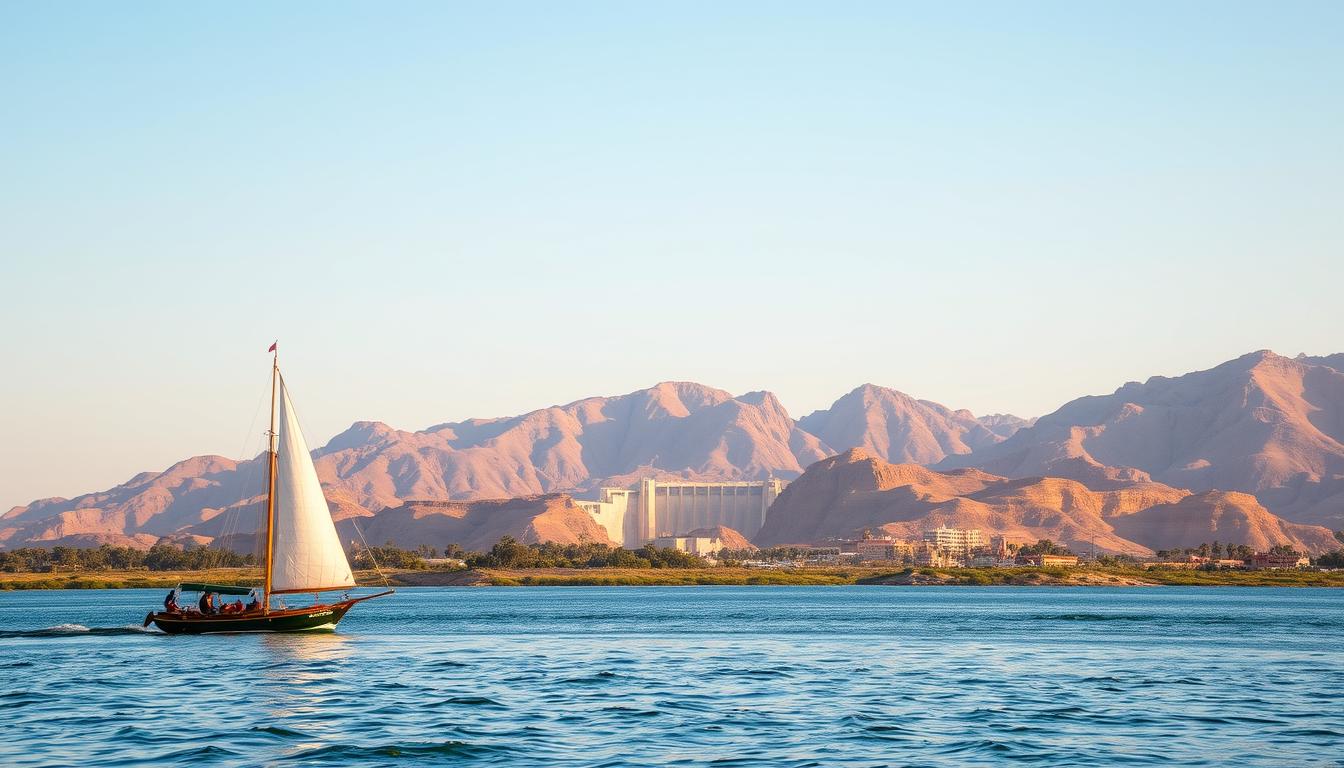Aswan is a city on the Nile River in Upper Egypt. It’s full of history and natural beauty. Gus Gleiter calls it a picturesque, slow-paced, historic city. It offers a unique travel experience.
The city’s historic significance is clear in its landmarks and monuments. It’s perfect for travelers wanting a culturally rich experience. Aswan’s calm and ancient attractions make it a must-see.
Key Takeaways
- Discover Aswan’s rich history and cultural heritage.
- Explore the city’s historic landmarks and monuments.
- Enjoy a relaxing atmosphere along the Nile River.
- Experience the unique blend of natural beauty and ancient attractions.
- Visit Aswan for a culturally enriching travel experience.
The Enchanting City of Aswan
Aswan is a city in southern Egypt, known for its rich history and natural beauty. It sits on the Nile River, making it a key cultural and historical spot.
Geographical and Historical Significance
Aswan has a mild climate and is near the First Cataract of the Nile. It was a major center in ancient Egypt, important for trade and culture. Its location made it vital for the Pharaonic civilization, with many historical sites showing its past glory.
The city’s location by the Nile is crucial. The Nile has always been Egypt’s lifeblood. Aswan’s landscape, with granite quarries and the Nile, offers a mix of natural beauty and history.
Best Time to Visit and Weather Considerations
The best time to visit Aswan is from October to February. The weather is mild and perfect for exploring. Summer is hot, while winters are mild and comfortable.
When planning your trip, think about the weather. The mild winters are great for seeing historical sites and enjoying the area’s beauty without the summer heat.
Must-Visit Aswan Attractions for Every Traveler
Aswan is a city filled with history and stunning views. It has something for everyone, from ancient sites to beautiful landscapes. This city is a mix of culture, history, and nature.
Overview of Aswan’s Diverse Appeal
Aswan is full of exciting things to see and do. You can see ancient temples or modern wonders. Or, you can enjoy the beauty of the Nile River.
Key Attractions in Aswan
| Attraction | Description |
|---|---|
| Philae Temple | A beautiful island temple dedicated to the goddess Isis |
| Aswan High Dam | A modern engineering marvel that created Lake Nasser |
| Nubian Museum | A museum showcasing the history and culture of the Nubian people |
Planning Your Itinerary
Planning your trip to Aswan is key to enjoying it. Think about the season, how fast you want to go, and what interests you. This will help you make the best plan.
Tips for Planning:
- Prioritize must-see attractions like Philae Temple and the Aswan High Dam
- Allow time for relaxation and spontaneity
- Research guided tour options or independent exploration
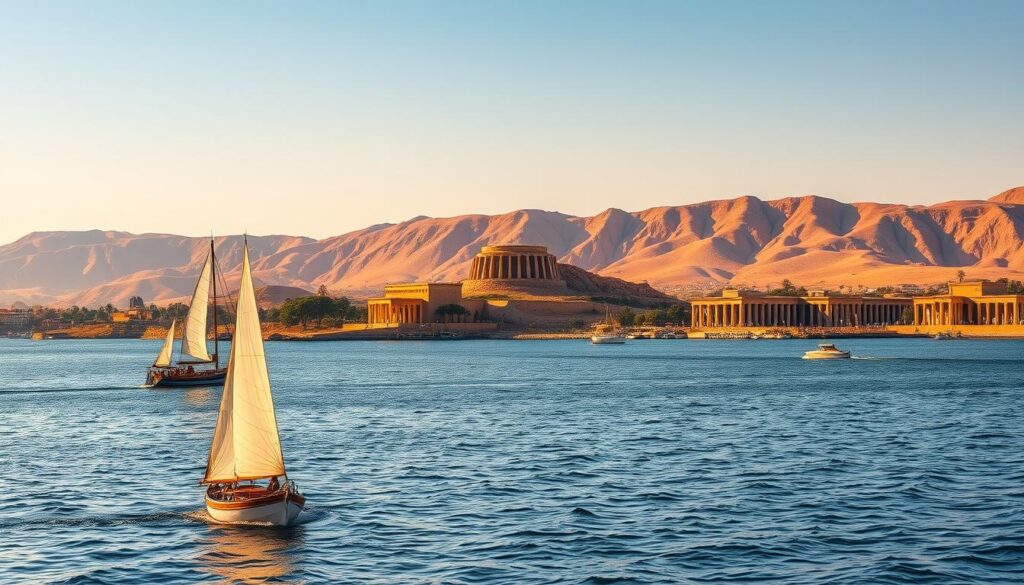
Guided Tours vs. Independent Exploration
Aswan offers both guided tours and exploring on your own. Guided tours give you expert knowledge and ease. Exploring alone lets you set your own pace and be more flexible.
Comparison of Guided Tours and Independent Exploration
| Aspect | Guided Tours | Independent Exploration |
|---|---|---|
| Expert Knowledge | Available through guides | Self-researched or through local interactions |
| Convenience | Pre-arranged itinerary | Flexible scheduling |
| Cost | Generally more expensive | Can be budget-friendly |
The Magnificent Philae Temple Complex
The Philae Temple Complex sits on an island in the Nile. It’s a stunning example of ancient Egyptian architecture and mythology. This site, dedicated to Isis, is a big draw for tourists in Aswan.
History and Mythology of Philae
The Philae Temple Complex dates back to the Ptolemaic period. It was believed to be Osiris’s burial site, making it sacred to ancient Egyptians. The complex shows the religious beliefs and practices of that time.
The mythology surrounding Philae is tied to Isis and Osiris. The temple’s stories and construction have captivated historians and archaeologists.
The UNESCO Rescue Operation
In the 1960s, the Aswan High Dam threatened to flood the Philae Temple Complex. UNESCO stepped in with a massive rescue effort. They moved the temples to higher ground, saving Egypt’s cultural heritage.
“The rescue of the Philae Temple Complex is considered one of the most significant archaeological achievements of the 20th century.”
Highlights and Must-See Features
The Philae Temple Complex boasts impressive structures like the Temple of Isis and the Sound and Light Show. Visitors can explore and learn about the site’s rich history and mythology.
The Temple of Isis
The Temple of Isis is the heart of the Philae Temple Complex. This temple, dedicated to Isis, is known for its detailed carvings and mythological scenes.
The Sound and Light Show
The Sound and Light Show at Philae is an evening spectacle. It uses advanced technology to bring the temple’s history and mythology to life. It’s an immersive experience for all who attend.
The combination of history, architecture, and entertainment makes the Philae Temple Complex a unique and unforgettable experience for travelers visiting Aswan.
Abu Simbel: A Monument to Ancient Engineering
Abu Simbel is a wonder of ancient engineering. It’s a top spot for anyone visiting Aswan. The site has two temples built by Ramses II, showing the greatness of ancient Egypt.
The Story Behind the Temples
The Abu Simbel temples were built in the 13th century BC. They celebrate Ramses II’s win at the Battle of Kadesh. The Great Temple honors Amun and Ra-Horakhty, with four huge statues of Ramses II.
The Great Temple of Ramses II
The Great Temple of Ramses II is a true marvel. Its facade has four giant statues of Ramses II sitting on thrones. Inside, you’ll see detailed carvings of the king’s battles and myths.
The Temple of Hathor and Nefertari
The smaller Temple of Hathor is for Ramses II’s wife Nefertari. It has six statues, including two of the queen. Inside, you’ll see Nefertari making offerings to Hathor.
Tips for the Abu Simbel Day Trip
For a great Abu Simbel day trip, follow these tips. Visit early to beat the heat. Don’t forget sunscreen, a hat, and an early start. Guided tours offer deep insights into the temples’ history and importance.
| Tips for Visiting Abu Simbel | Details |
|---|---|
| Best Time to Visit | Early morning to avoid heat |
| Guided Tours | Available for insightful commentary |
| Precautions | Bring sunscreen, hat, and water |
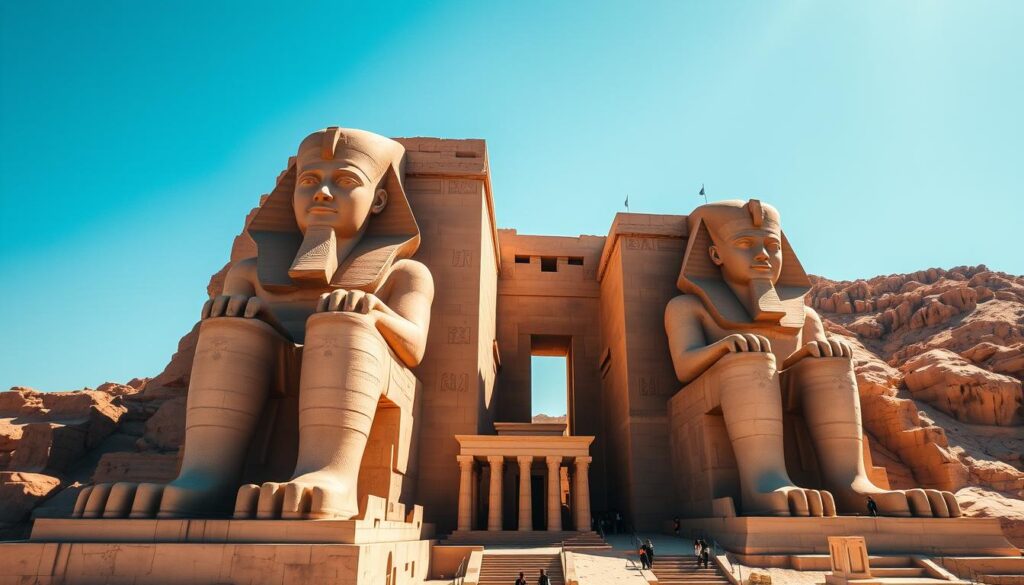
Exploring the Aswan High Dam
The Aswan High Dam is a major engineering achievement of the 20th century. It’s a key spot to visit in Aswan. The dam helps control the Nile’s flooding and is a symbol of Egypt’s modern era.
Historical Impact and Construction
The dam’s construction started in 1960 and finished in 1970. It was built to stop the Nile’s flooding, a long-standing issue. Thousands of workers and engineers worked hard to build it.
The dam’s impact on the region is huge. It created Lake Nasser, a massive artificial lake, and provides Egypt with hydroelectric power.
The dam is 1,965 meters long and 111 meters high. Its construction moved thousands of people and rebuilt historic sites. It shows human ingenuity and engineering skill.
Visitor Experience and Viewpoints
Visitors can explore the dam and learn about its history. The dam has viewpoints with amazing views of Lake Nasser. The visitor center shares details about the dam’s construction and importance.
Guided tours are available for those wanting to know more. These tours dive deep into the dam’s operations and its economic role. The Aswan High Dam is a marvel and a top tourist attraction in Aswan, attracting visitors worldwide.
Nubian Museum: Preserving Cultural Heritage
The Nubian Museum is a key cultural spot in Aswan. It shows the rich history and culture of Nubia. It’s a must-see for anyone interested in the region’s past.
The Museum’s Architecture and Design
The museum’s design is a mix of old and new. It reflects the culture it celebrates. The building’s layout makes it easy for visitors to enjoy the exhibits.
Key Exhibits and Artifacts
The museum has many artifacts that tell Nubian stories. Some highlights include:
- Ancient Nubian pottery and ceramics
- Historical artifacts from the Pharaonic and Roman periods
- Traditional Nubian clothing and jewelry
Cultural Programs and Events
The museum is more than just a place to see artifacts. It’s a hub for culture. It hosts workshops, lectures, and traditional music and dance.
Visiting the Nubian Museum lets you dive deep into Nubia’s culture. It’s a key stop for anyone exploring Aswan.
Sailing the Nile: Felucca Experiences in Aswan
The felucca, a traditional Egyptian sailboat, offers a unique view of Aswan. Sailing on the Nile, visitors can see the city’s beauty and history from a new angle.
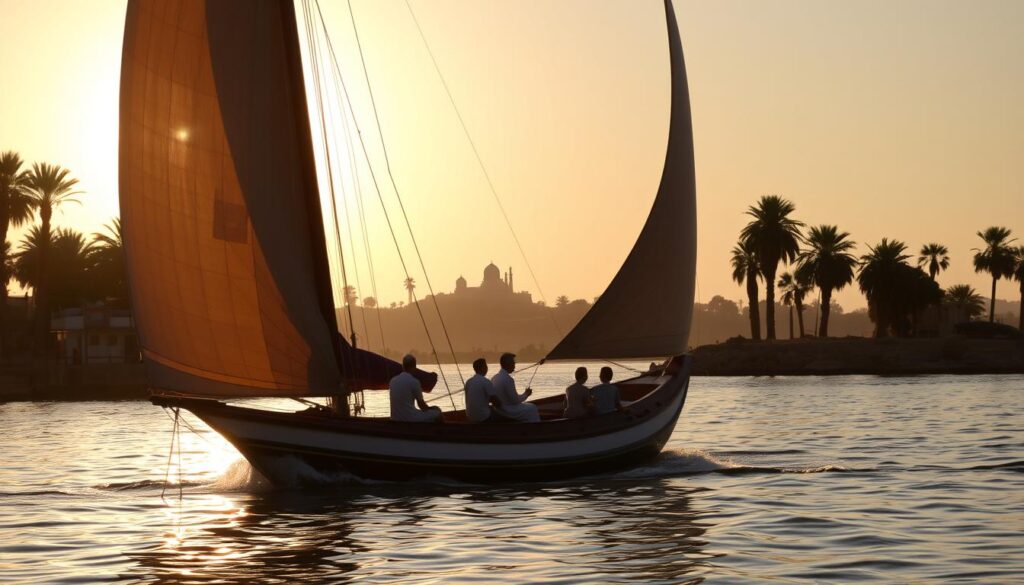
Traditional Felucca Boat Tours
Traditional felucca tours in Aswan are peaceful. They last a few hours and let you see landmarks while feeling the Nile’s breeze.
Sunset Cruises on the Nile
A sunset cruise on the Nile is magical. As the day ends, the sky turns orange and pink, making for a stunning sail.
Multi-Day Sailing Adventures
For a deeper experience, try multi-day sailing trips. These adventures let you see more of the Nile and visit hidden spots.
Aswan to Kom Ombo Route
The Aswan to Kom Ombo route is a favorite for longer trips. It takes you through Egypt’s most beautiful landscapes and historical sites.
What to Pack for Your Felucca Journey
When going on a felucca trip, pack smart. Here are some must-haves:
- Comfortable clothes and sun protection
- Water and snacks
- A camera for the views
- Binoculars for closer looks
| Item | Importance | Notes |
|---|---|---|
| Sun hat | High | Protects from the sun |
| Sunscreen | High | Prevents sunburn |
| Water bottle | Medium | Stay hydrated |
Elephantine Island: Archaeological Wonders
Located in the heart of the Nile, Elephantine Island is a treasure trove of archaeological wonders. This island has been a significant cultural and historical site for thousands of years. It offers insights into the ancient civilizations that once flourished here.
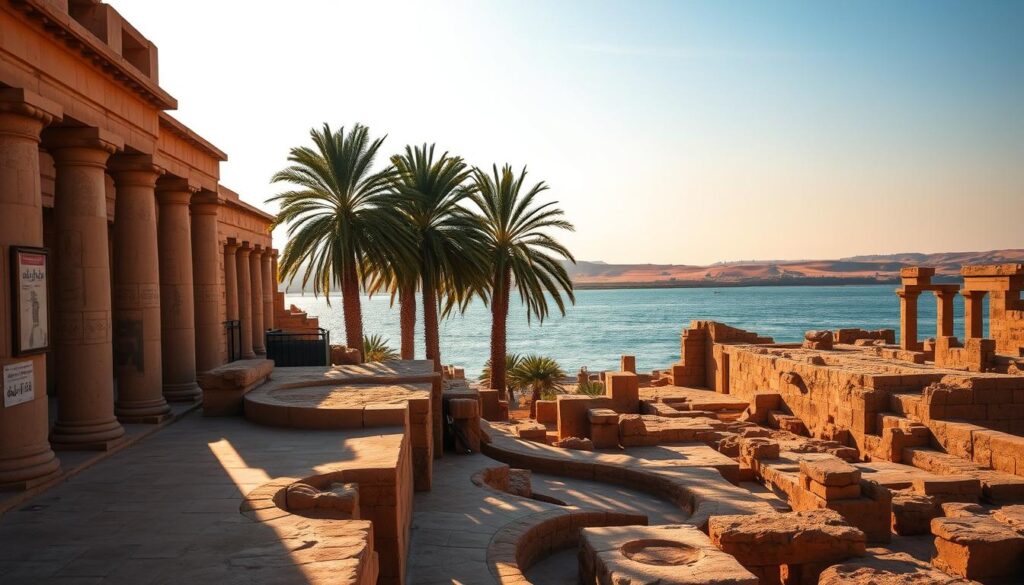
Ancient Ruins and Excavations
Elephantine Island is home to numerous ancient ruins and excavations. These ruins showcase the rich history of the region. Visitors can explore these ruins, gaining a deeper understanding of the island’s historical significance.
The Nilometer and Its Significance
The Nilometer, an ancient structure used to measure the Nile’s water level, is a highlight of Elephantine Island. This architectural marvel played a crucial role in predicting floods and ensuring the fertility of the surrounding land. The Nilometer is a testament to the ingenuity of ancient engineers and continues to fascinate visitors today.
Aswan Museum Collections
The Aswan Museum, located on Elephantine Island, houses a vast collection of artifacts. These artifacts were discovered on the island and in the surrounding areas. The museum’s collections provide valuable insights into the history and culture of Aswan, featuring a range of objects from various periods.
Visiting Elephantine Island offers a unique opportunity to explore the rich cultural heritage of Aswan. With its ancient ruins, the Nilometer, and the Aswan Museum, the island is a must-visit destination. It is perfect for anyone interested in history, archaeology, and the natural beauty of the Nile.
Hidden Gems Among Aswan Attractions
Aswan has more than just famous sites. There are hidden gems waiting to be found. These lesser-known spots offer a unique look into Aswan’s history and culture. For those who want to استكشف أسوان deeply, Aswan has many fascinating places to explore.
The Unfinished Obelisk
The Unfinished Obelisk shows ancient stoneworking skills. It would have been the biggest obelisk ever if finished. Visitors can see it still attached to the rock, giving a peek into ancient construction methods.
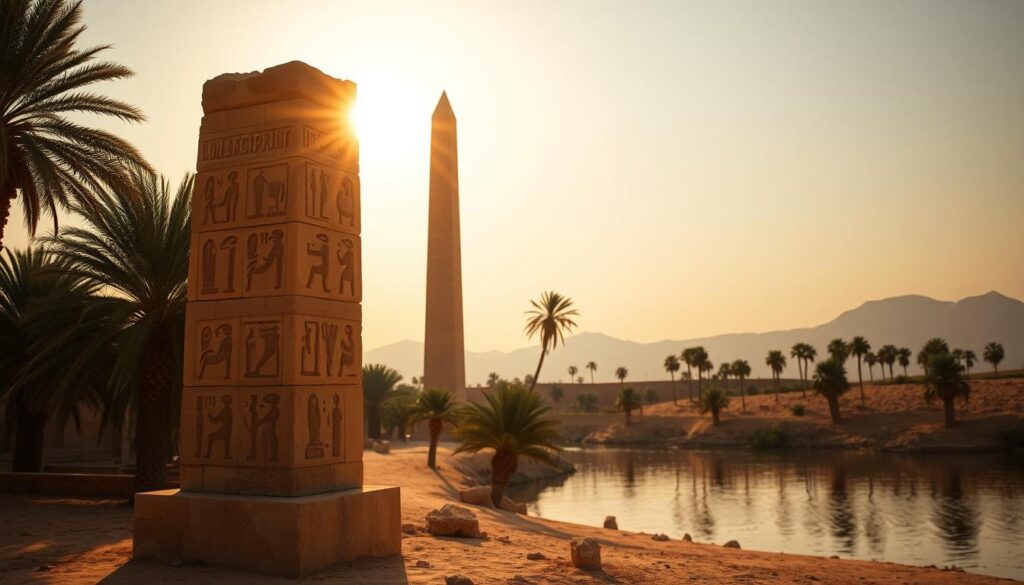
Tombs of the Nobles
The Tombs of the Nobles date back to the Middle Kingdom. They are filled with detailed carvings and paintings. These tombs give a glimpse into the lives of Aswan’s ancient nobility, perfect for history buffs.
Monastery of St. Simeon
The Monastery of St. Simeon is from the 6th century. It sits on the west bank of the Nile, offering stunning views.
Architecture and Religious Significance
The monastery’s design mixes Coptic and Byzantine styles. It has been a key Christian site for centuries, housing many historical artifacts.
The Desert Trek Experience
Visitors can also enjoy a desert trek here. The desert around the monastery is great for hiking, showing off the area’s natural beauty.
| Attraction | Historical Significance | Visitor Experience |
|---|---|---|
| The Unfinished Obelisk | Ancient stoneworking techniques | Insight into construction methods |
| Tombs of the Nobles | Middle Kingdom period burial sites | Intricate carvings and paintings |
| Monastery of St. Simeon | 6th-century Coptic monastery | Breathtaking views and desert trek |
Aswan is full of history and أماكن لا بد من رؤيتها في أسوان. Exploring these hidden spots helps visitors understand the city’s culture and history better.
Botanical Gardens on Kitchener’s Island
Kitchener’s Island is a peaceful spot in Aswan, Egypt. It has one of Egypt’s most beautiful botanical gardens. It’s a perfect place for those who love nature and history.
History of Lord Kitchener’s Garden
Lord Kitchener, a British leader, started the gardens in the late 1800s. He was key in the British campaign in Sudan. Kitchener wanted a peaceful place, filled with exotic plants.
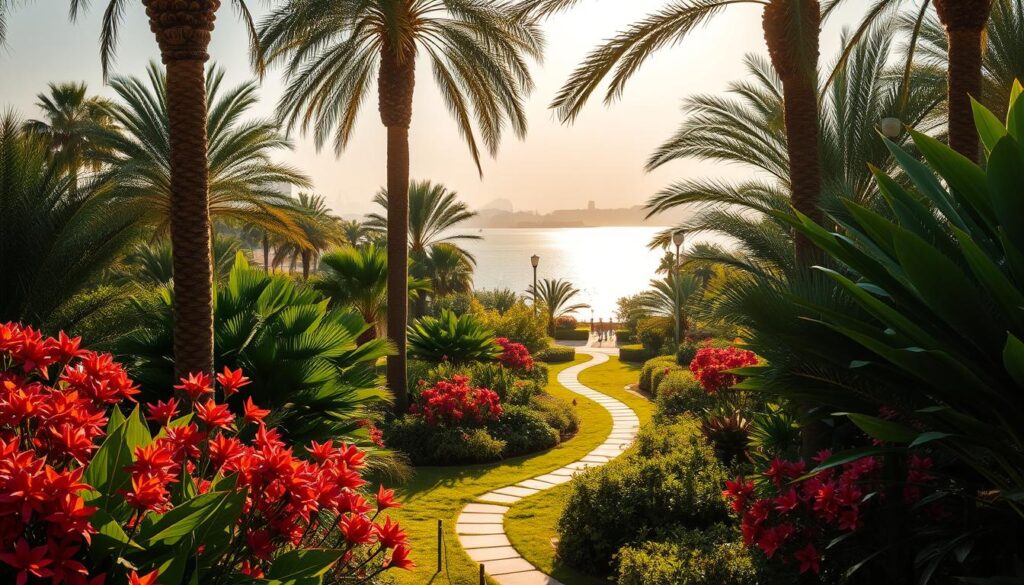
Exotic Plants and Walking Paths
The gardens are famous for their exotic plants from all over. You can walk through the paths and enjoy the colors and smells. It’s great for families and couples to explore together.
Bird Watching Opportunities
Kitchener’s Island is also great for bird watching. Many bird species visit the gardens. It’s a calm place to see birds up close.
Visiting the gardens is a wonderful way to see Aswan’s beauty. It’s perfect for those interested in جولات سياحية في أسوان or exploring الأماكن السياحية في أسوان.
Experiencing Nubian Village Life
The Nubian village is a vibrant spot in Aswan, known for its colorful houses and friendly people. It’s a great place to see the rich culture of the Nubian people.

Cultural Immersion and Hospitality
When you visit the Nubian village, you can try traditional Nubian food and watch music and dance. The Nubians are very welcoming, making your visit special and full of cultural experiences.
Traditional Nubian Architecture
The village is famous for its colorful houses. These houses show off the Nubian architecture and history. It’s a great place to learn about the Nubian culture.
Shopping for Authentic Crafts and Souvenirs
Shopping in the Nubian village is a highlight. You can find unique items like handmade jewelry and traditional clothes. These items show the rich culture of the Nubian people.
| Activity | Description | Cost |
|---|---|---|
| Cultural Dance Performance | Enjoy a lively Nubian dance performance | $10 |
| Traditional Nubian Lunch | Savor local Nubian cuisine | $15 |
| Handmade Crafts Workshop | Learn to create traditional Nubian crafts | $20 |
Practical Travel Tips for Visiting Aswan
Aswan is a place with rich culture and beautiful views. To make your trip better, here are some tips.
Accommodation Options for All Budgets
Aswan has many places to stay, for every budget. You can find luxury hotels with Nile views or cozy guesthouses that are cheaper.
Luxury Hotels Along the Nile
Luxury hotels in Aswan are amazing. They are right by the Nile River. You’ll get great service, delicious food, and tours.
Mid-Range and Budget Accommodations
If you’re watching your money, Aswan has good deals. Mid-range hotels and guesthouses are clean and comfy but not too pricey. They’re perfect for seeing the local life without spending a lot.
Getting Around Aswan
Getting around Aswan is easy. You can take a traditional felucca, a taxi, or go on foot. Each way lets you see different parts of the city.
| Mode of Transport | Description | Cost |
|---|---|---|
| Felucca | Traditional sailboat ride along the Nile | Approximately $10-$20 per person |
| Taxi | Private car service for city tours | Negotiable, around $5-$10 per ride |
| Walking Tour | Self-guided or guided walk through historical sites | Free or guided tour prices vary |
Safety, Etiquette, and Cultural Considerations
Respecting local customs is key in Aswan. Dress modestly, and be polite when visiting sacred places. Also, keep up with local news and follow travel advice for a safe visit.
Conclusion: The Timeless Appeal of Aswan
Aswan is a city that offers a unique and timeless travel experience. Travel enthusiasts like Carrie Salter agree. The city’s rich history, cultural heritage, and breathtaking landscapes make it perfect for travelers looking for an unforgettable adventure.
Aswan’s attractions are diverse and cater to all interests. You can see the majestic Philae Temple Complex or take a serene Felucca ride along the Nile. There are also hidden gems like the Unfinished Obelisk and the Tombs of the Nobles to explore. Plus, the Nubian Museum showcases the city’s vibrant cultural scene.
When planning your trip to Aswan, you’ll find that its attractions are a testament to its enduring legacy. Whether you’re into history, culture, or just want to enjoy the sun, Aswan has something for everyone. With its warm hospitality and stunning scenery, Aswan is a destination that will leave you with unforgettable memories.

